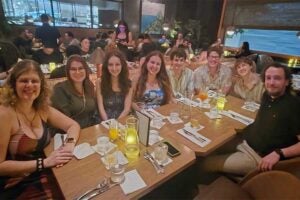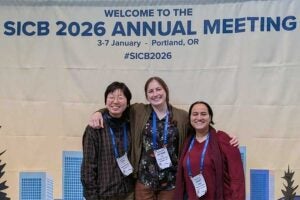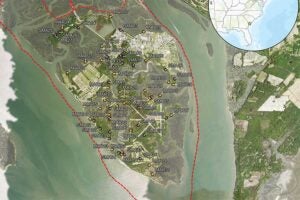Research News Archive
The Department of Biological Sciences at the College of Science proudly highlights recent presentations by members of the Palmquist lab at the 2026 Society for Range Management Annual Meeting held February 7–11 in Monterey, California. The event brought together researchers, land managers, ranchers, students, and agency professionals to explore rangeland science and sustainable grazing practices
A graduate student in the Department of Biological Sciences at the College of Science is receiving support for his research from a regional nonprofit dedicated to environmental education and restoration. Brian Brillhart, a master’s student at Marshall University, has been awarded a mini research grant from Appalachian Headwaters, a Lewisburg-based nonprofit focused on ecological restoration
Dr. Mindy Armstead, professor and chair of Natural Resources and Earth Sciences in the College of Science at Marshall University, was honored today at the Marshall University Board of Governors meeting for her ongoing research contributions. Her work on improving flood monitoring and prediction in Appalachian headwater streams was recently featured in Environmental Monitor, highlighting
Dr. Rosalynn Quiñones, professor of chemistry, and Delaney Geary, a senior majoring in forensic chemistry, have received prestigious awards from the Society of Toxicology for 2026. Both were recognized through the Society’s Undergraduate Development Program and will represent Marshall University at the 2026 SOT Annual Meeting. Dr. Quiñones received the Undergraduate Development Program Advisor Travel
Seven chemistry students from the College of Science shared their research on an international stage in December 2025 at Pacifichem 2025 in Honolulu, Hawaii. The students presented poster presentations alongside Dr. Rosalynn Quiñones, representing Marshall University at one of the world’s largest chemistry conferences. Student presenters included Levi Blankenship, Alexis Kiara Bowles, Jose Buxo, Andrew
Faculty and students from the Department of Mathematics and Physics represented Marshall University at the Joint Mathematics Meetings in January, the largest mathematics conference in the world. The annual conference brings together thousands of mathematicians to share new research, organize specialty sessions, and highlight student scholarship. Several faculty members served as session organizers and presenters.
The Tait Lab in the Department of Biological Sciences recently returned from the annual meeting of the Society for Integrative and Comparative Biology, held this year in Portland, Oregon. Undergraduate researchers Sandra Gerges and Jessi Lin represented Marshall University with poster presentations on their projects. Gerges shared her work on regeneration in nudibranch sea slugs,
Dr. Anne Axel, Dr. Kyle Palmquist, and Dr. Pamela Puppo from the Department of Biological Sciences have published a new research article in the journal Vegetation Classification and Survey. The paper, “Characterizing and mapping coastal vegetation on a sea island in the southeastern USA,” presents advanced ecological mapping and vegetation classification focused on Parris Island,
The Armstead Lab is gaining national attention for its work to improve flood monitoring and prediction in Appalachian headwater streams. Ongoing research led by Dr. Mindy Yeager-Armstead, professor in Natural Resources & the Environment (NRE), was recently featured in Environmental Monitor as part of a story highlighting the multi-state FLASH and CLIMBS research efforts in
Four Chemistry students, Lauren Dunsmore, Ash Mills, Teaghan Beasley, and Greg Jimison, traveled with Dr. Michael Wade Wolfe to Kent State University on November 7–8 to present their research at the regional conference Ohio Inorganic Weekend. Lauren Dunsmore presented a poster titled Self-Assembled Dendritic Catalysts: New Biphasic Approach for Homogeneous Catalyst Recycling, highlighting zinc-mediated self-assembly









